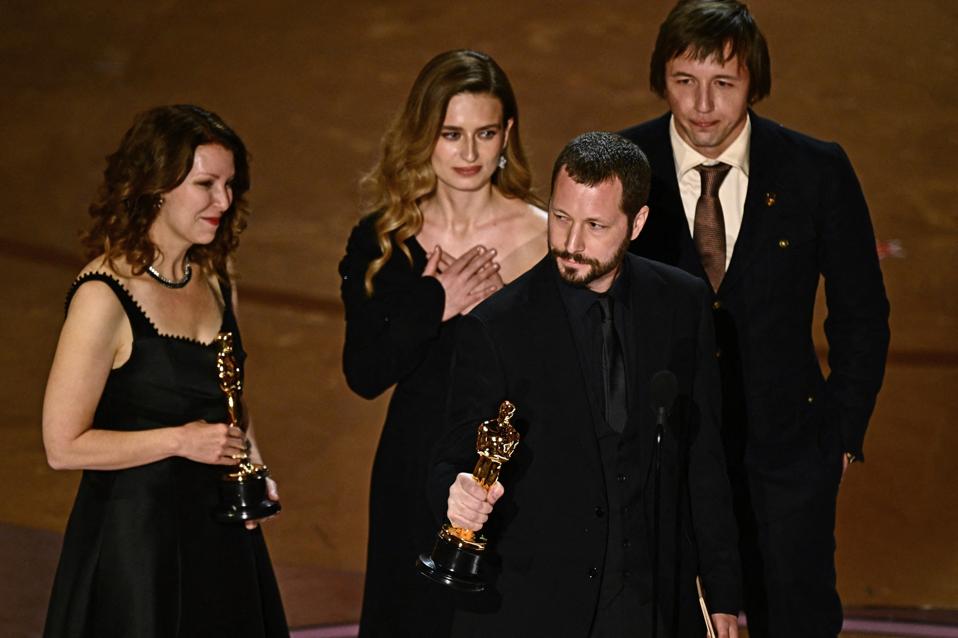Dispatches from Ukraine. Day 747.
“20 days in Mariupol,” a gut wrenching first-person account of Russia’s 2022 full-scale invasion and siege of the Ukrainian city of Mariupol, won the Oscar for best documentary feature on Mar. 10. This is the first time since Ukraine’s independence after the breakup of the Soviet Union that a Ukrainian film has received worldwide recognition of this kind. Members of the Associated Press team behind the film, headed by Mstyslav Chernov, with Vasylisa Stepanenko and photographer Yevhen Maloletka, took the stage to accept the award.
“I will be the first director on this stage who will say I wish I had never made this film,” Chernov said in his speech. “I wish to be able to exchange this for Russia never attacking Ukraine, never occupying our cities. Russians are killing tens of thousands of my fellow Ukrainians. I wish for them to release all the hostages, all the soldiers who are protecting their lands, all the civilians who are now in their jails. But I cannot change history. I cannot change the past.”
As these words echoed through the hall, Chernov also urged the cinema society to use their voices to commemorate those Ukrainians whose lives were tragically lost. “We can make sure that the history record is set straight, and that the truth will prevail and that the people of Mariupol and those who have given their lives will never be forgotten, because cinema forms memories, and memories form history.” Chernov closed his moving address with “Slava Ukraini!” or “Glory to Ukraine” the war’s rallying cry.
The portion of the 96th Academy Awards ceremony where the Ukrainian documentary film “20 Days in Mariupol” won its category, reportedly, was cut from the shorter, international version of the broadcast. “Our team was shocked and deeply disappointed when we did not see in the international version’s edit the nomination ‘Best Feature-Length Documentary Film’, where the film ’20 Days in Mariupol’ rightfully won its award,” said Lukyan Galkin, executive producer for Ukrainian public television culture channel Suspline Cultura. “The film’s director’s Mstyslav Chernov’s powerful speech emphasized the unity between Ukraine and the world — it’s all the more painful to see the exclusion of this truthful and powerful episode from the version distributed to the world’s Oscar award licensees,” Galkin continued. “Remember that last year, for the same nomination won by the documentary about Navalny, there was room in the shortened version, as well as for the political speech of his wife Yulia Navalnaya, who accepted this seemingly apolitical award. We hope that the award organizers will listen to our protest.”
The Swiss parliament approved a series of motions that pave the way toward allowing the use of Russian assets for reparations. The motions narrowly passed the upper house of parliament by a vote of 21-19, with three abstentions; they passed last year in lower house. More than $8 billion in Russian central bank reserves and assets are held in Switzerland. This is an important step toward creating an international legal basis for using frozen aggressor-state assets to pay for reparations in attacked countries.
During a working visit to Turkey, Ukrainian President Volodymyr Zelensky handed his Turkish counterpart, Recep Tayyip Erdoğan, a list of Ukrainian citizens detained by Russia, as Turkey’s mediation plays a significant role in negotiations with Russia. Erdoğan emphasized that Crimean Tatars are steadfastly fighting for the restoration of Ukraine’s territorial integrity, and his country will continue to support the Crimean Tatar people.
Ukraine quickly pushed back against comments by Pope Francis, made public Mar. 9, urging Ukraine to bring a negotiated end to the war by having the “courage of the white flag.” Foreign minister Dmytro Kuleba strongly rejected the idea of surrender elicited by the Pope’s “white flag” comment in a post on X. “Our flag is a yellow and blue one,” Kuleba said. “This is the flag by which we live, die, and prevail. We shall never raise any other flags.” Ukraine allies also pointedly responded to the pontiff. “How about, for balance, encouraging Putin to have the courage to withdraw his army from Ukraine?” said Polish foreign minister Radosław Sikorski, speaking for his majority Catholic nation, in a post on X. NATO secretary general Jens Stoltenberg countered the Pope’s comment in a Mar. 11 Reuters interview. “If we want a negotiated peaceful lasting solution, the way to get there is to provide military support to Ukraine,” he said.
Local:
Sumy Region. A Russian missile strike on the city of Sumy in northern Ukraine killed two people and injured 26 others on Mar. 7, said the regional military administration. A school, a hospital, the regional emergency medical center, and the water utility were damaged in the strike, with a total of 135 windows and 10 doors were smashed.
Kharkiv Region. Russian attacks targeted about 18 cities and towns across Ukraine’s eastern province of Kharkiv on Mar. 7, killing multiple civilians, according to regional military governor Oleh Synegubov. In the city of Kupiansk, Russian shelling hit private homes, killing a 64-year-old woman and a 58-year-old man. In the cith of Vovchansk, less than 10 kilometers (6 miles) from the Russian border, Russian shelling killed a 40-year-old woman in a direct hit on a private home. A day later in Vovchansk, an enemy FPV drone, or First Person View drone, which allows the remote pilot to see what it is seeing in real time, hit a civilian car, killing a 53-year-old man and a 48-year-old woman Synegubov said.
Daria Dzysiuk, Karina L. Tahiliani

